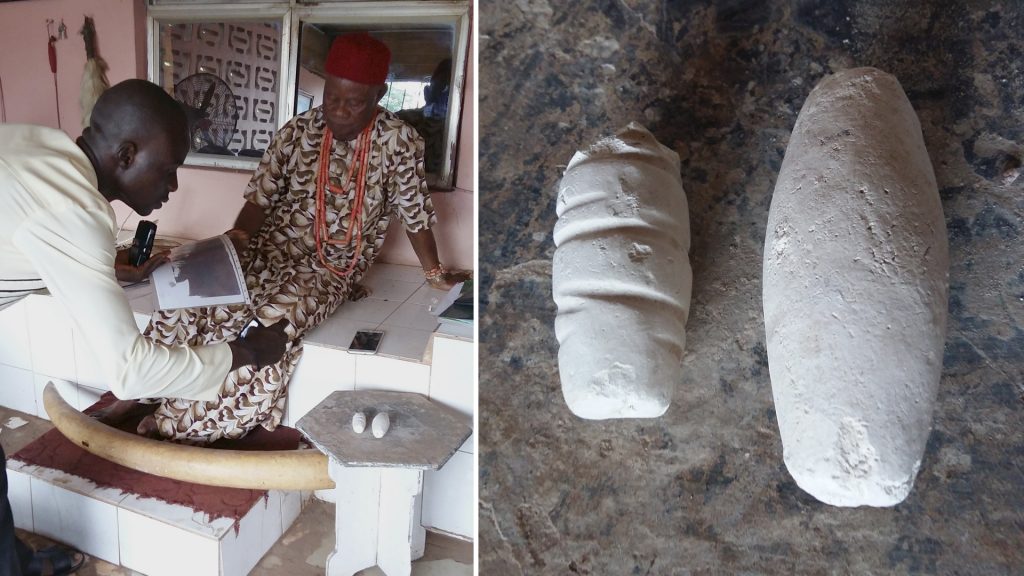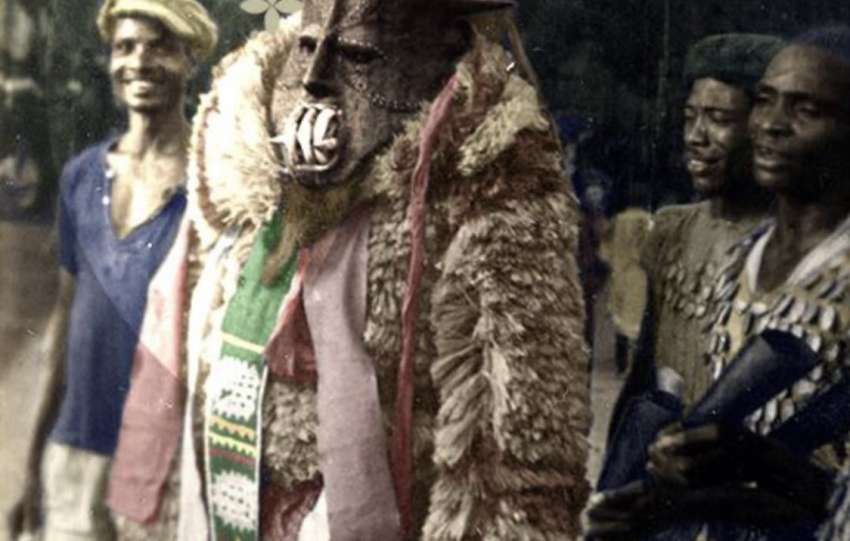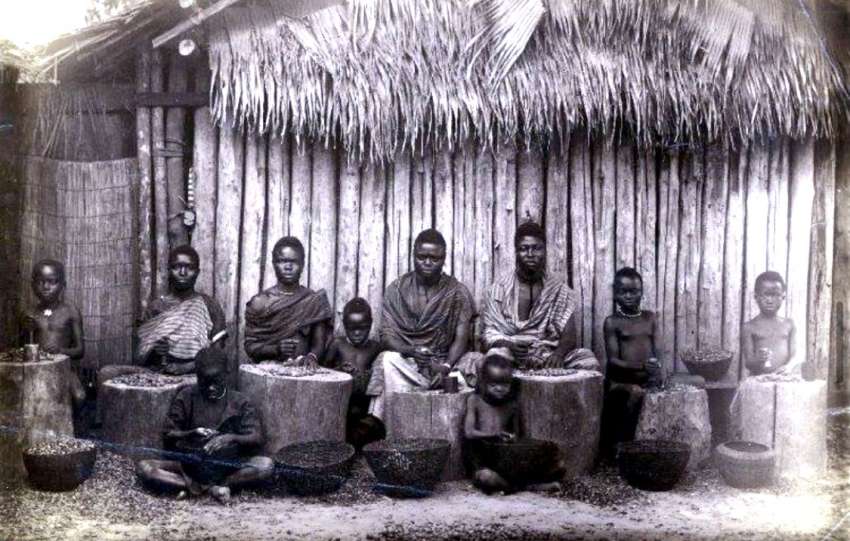
Ọdinala, also known as Ọdinani, translates to “as it is in the Earth/land”; it is the ancestral spiritual science of the Igbo people. This represents traditional Igbo beliefs that Ani/Ala, the Divine Earth Mother, creates the center of human life, and highlights a spiritual connection the Igbo people have with primordial, cosmic forces, and the life essence within natural elements.
Nzu is a kind of white sacred chalk within the Igbo culture and is also known as Kaolin throughout other West African cultures. It is a very meaningful and one of the most sacred substances, it represents purity and ancestral wisdom. It has many uses, from various rituals to other purposes in Odinani, and it has become integral to Igbo cultural practice. Here are seven of the many traditional usages of Nzu in Odinani that also bring out its importance:
1. Purification
Nzu is the vital ingredient for rituals and ceremonies in Igbo, representing purity and personification of the spiritual nature of positive energies, an Igbo cultural practice that embraces co-existence between spiritual and physical planes. Nzu is applied to the body after a bath for purification, due to its powers in cleansing one from evil and also protecting. It is used in the activities of Igọ Ọfọ or Igọ Mmuọ to facilitate clear communication with one’s higher self and forces, stressing the need for purity in this spiritual connective process and warding off negativity.

2. Igọ Ọfọ and Igọ Mmuọ Prayers
Nzu is held or used to draw sacred lines on the floor for holiness, connecting to the earth during a traditional ritual, and is normally symbolized by Igbo market days.
Nzu applied during the course of Igọ Mmuọ or Igọ Ofọ ceremonies and rituals would wake up the cosmic energies, enabling them to get in touch with ancestral forces.

3. Beautification and Artistic Purposes
Traditionally, Nzu is applied on the body to create interesting designs on it. For a while now, Igbos have used spiral patterns for hand-carved Nzu lobes to give additional aesthetic value and raise commercial appeal due to the differentiation between feminine and masculine shapes and designs. At times, carved sigils are inlaid with powdered Nzu in order to embed them with the metaphysical properties of holy chalk, raising their spiritual value and visual appeal.
4. Sacred Spaces: Altars and Shrines
Nzu is put in especially holy places to be able to fill and charge the atmosphere with good energies. Properly aligning the altars or shrines with the intended spiritual frequencies that might be necessary for the ceremonial rite or ritual conducted in those places.

5. Edible Pacifier
Nzu is sometimes consumed by pregnant women, while in other cases, the smoked form is eaten by those who have a particular love for it.
This practice is believed to help detoxify and, in pregnant women, it promote a healthy pregnancy by offering strength and vitality to both the mother and unborn child.
Nzu is also believed to ease delivery and reduce labor pains when taken according to customary usage.
6. Hospitality Nzu:
It is a sign of goodwill and friendship. It plays an important role in ensuring purity of intentions for guests and, therefore, is offered as a sign of peace and warm reception to put guests in a safe and welcome position with any household or traditional event.
7. Ichu Aja Offering and Rites
Nzu is used as a tool to appease the gods and spirits, in thanksgiving or sacrificial rituals to one’s ancestral or spiritual forces, the combination of Nzu with other elements is used to appease or raise one’s requests to the intended forces. During initiation ceremonies like the Iru Agwu rite, Nzu also plays a role in various stages and is administered in application alongside other customary tools like Igbo kola nut (Ọji), alligator pepper (Ose Ọji), and palm wine for the spiritual awakening rites.
These various symbolisms and uses of Nzu in the Ọdinani, Igbo cultural and spiritual practices, therefore, reflect the great spiritual significance and depth of culture that is invested in the Igbo traditions. Nzu is white chalk which is intertwined into the Igbo’s cosmology; it acts as a medium with which ancestral forces are communicated and through which spiritual awareness is heightened among Ọdinani practitioners.

Historical Significance in Rituals and Ceremonies
Further understanding of the use of Nzu in traditional rituals is given by anthropological records done by Northcote Thomas, a Government Anthropologist who, from 1909 to 1913 worked in both Nigeria and Sierra Leone.
His observations included chalk used in Edo and Igbo ceremonies, symbolizing purity, good fortune, and hospitality.
Initiates are marked with Nzu in the title-taking ceremonies, such as the coronation of a new king (obi) to identify them with ancestors, purity, and blessing.
Native doctors also uses Nzu around their eyes as a mark of spiritual sight by which they are able to “see” beyond the physical world. The chalk goes around the eyelid to enhance a diviner’s ability to speak with spiritual forces, a practice continuing today among traditional healers.

Nzu holds a lot of cultural and spiritual significance in Ọdinani. It makes various purificatory and divinatory acts more rounded, from hospitality to purity and aesthetic beauty. From the beginning of time in historical accounts to the present day, Nzu continues to be that essential spiritual substance, a representative of purity and wisdom the Igbo hold dear. The fact that Nzu’s significance has survived the tests of time speaks volumes about resilience as a cornerstone of Igbo identity.
References
- Basu, Paul, ed. Re-entanglements: Colonial Collections in Decolonial Times. Manchester University Press, 2021.
- Thomas, Northcote W. Anthropological Report on the Ibo-speaking Peoples of Nigeria. The Harrison and Sons Printers, 1914.
- Onuoha, Nkechi. “Nzu in Igbo Cosmology: Understanding the Sacred Chalk.” Journal of African Cultural Studies, 2019.



